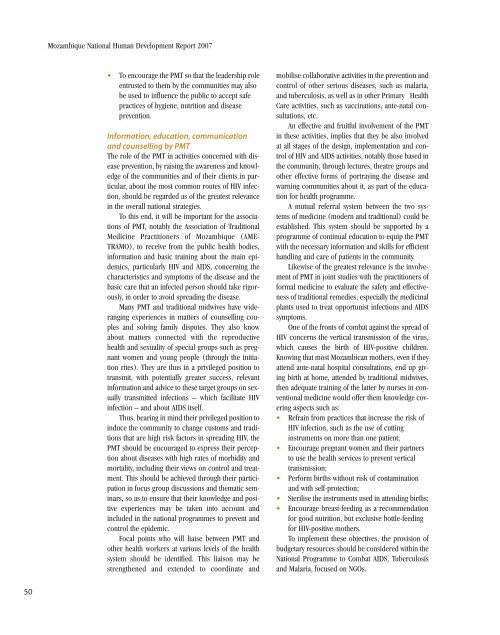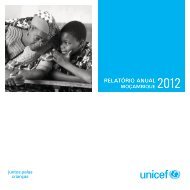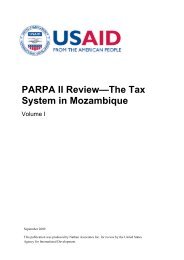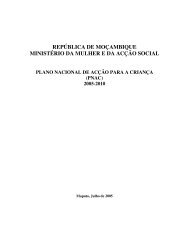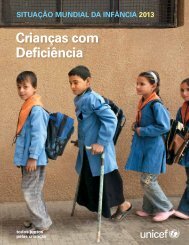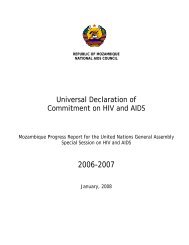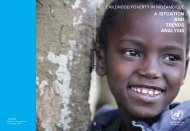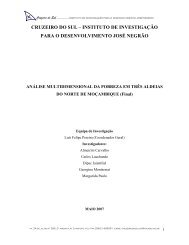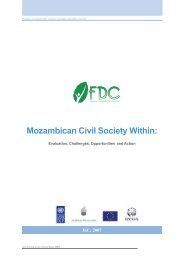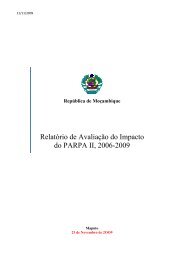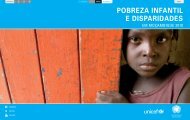English language version - Human Development Reports - United ...
English language version - Human Development Reports - United ...
English language version - Human Development Reports - United ...
- No tags were found...
You also want an ePaper? Increase the reach of your titles
YUMPU automatically turns print PDFs into web optimized ePapers that Google loves.
Mozambique National <strong>Human</strong> <strong>Development</strong> Report 2007• To encourage the PMT so that the leadership roleentrusted to them by the communities may alsobe used to influence the public to accept safepractices of hygiene, nutrition and diseaseprevention.Information, education, communicationand counselling by PMTThe role of the PMT in activities concerned with diseaseprevention, by raising the awareness and knowledgeof the communities and of their clients in particular,about the most common routes of HIV infection,should be regarded as of the greatest relevancein the overall national strategies.To this end, it will be important for the associationsof PMT, notably the Association of TraditionalMedicine Practitioners of Mozambique (AME-TRAMO), to receive from the public health bodies,information and basic training about the main epidemics,particularly HIV and AIDS, concerning thecharacteristics and symptoms of the disease and thebasic care that an infected person should take rigorously,in order to avoid spreading the disease.Many PMT and traditional midwives have widerangingexperiences in matters of counselling couplesand solving family disputes. They also knowabout matters connected with the reproductivehealth and sexuality of special groups such as pregnantwomen and young people (through the initiationrites). They are thus in a privileged position totransmit, with potentially greater success, relevantinformation and advice to these target groups on sexuallytransmitted infections – which facilitate HIVinfection – and about AIDS itself.Thus, bearing in mind their privileged position toinduce the community to change customs and traditionsthat are high risk factors in spreading HIV, thePMT should be encouraged to express their perceptionabout diseases with high rates of morbidity andmortality, including their views on control and treatment.This should be achieved through their participationin focus group discussions and thematic seminars,so as to ensure that their knowledge and positiveexperiences may be taken into account andincluded in the national programmes to prevent andcontrol the epidemic.Focal points who will liaise between PMT andother health workers at various levels of the healthsystem should be identified. This liaison may bestrengthened and extended to coordinate andmobilise collaborative activities in the prevention andcontrol of other serious diseases, such as malaria,and tuberculosis, as well as in other Primary HealthCare activities, such as vaccinations, ante-natal consultations,etc.An effective and fruitful involvement of the PMTin these activities, implies that they be also involvedat all stages of the design, implementation and controlof HIV and AIDS activities, notably those based inthe community, through lectures, theatre groups andother effective forms of portraying the disease andwarning communities about it, as part of the educationfor health programme.A mutual referral system between the two systemsof medicine (modern and traditional) could beestablished. This system should be supported by aprogramme of continual education to equip the PMTwith the necessary information and skills for efficienthandling and care of patients in the community.Likewise of the greatest relevance is the involvementof PMT in joint studies with the practitioners offormal medicine to evaluate the safety and effectivenessof traditional remedies, especially the medicinalplants used to treat opportunist infections and AIDSsymptoms.One of the fronts of combat against the spread ofHIV concerns the vertical transmission of the virus,which causes the birth of HIV-positive children.Knowing that most Mozambican mothers, even if theyattend ante-natal hospital consultations, end up givingbirth at home, attended by traditional midwives,then adequate training of the latter by nurses in conventionalmedicine would offer them knowledge coveringaspects such as:• Refrain from practices that increase the risk ofHIV infection, such as the use of cuttinginstruments on more than one patient;• Encourage pregnant women and their partnersto use the health services to prevent verticaltransmission;• Perform births without risk of contaminationand with self-protection;• Sterilise the instruments used in attending births;• Encourage breast-feeding as a recommendationfor good nutrition, but exclusive bottle-feedingfor HIV-positive mothers.To implement these objectives, the provision ofbudgetary resources should be considered within theNational Programme to Combat AIDS, Tuberculosisand Malaria, focused on NGOs.50


